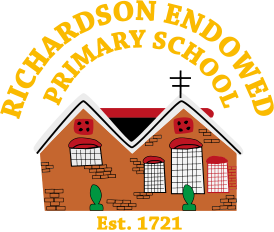Science
Intent
Science is a spark of wonder that ignites curiosity that takes us on a journey of discovery.
Science at Richardson Endowed Primary School should promote and nurture curiosity and wonder. Children are encouraged to generate their own questions as well as the approaches to finding the answers.
Learners are encouraged to make mistakes on the path to discovery. Practical investigations create opportunities to develop enquiring minds in search of answers.
By following the footsteps of scientists from the past, children will learn how to make their own impact in the future.
Children develop respect for the natural world and our position in it, recognising that science impacts all aspects of our lives.
Key Learning
| Curiosity | Discovery | Impact & Understanding | Respect |
What do I want to find out? What do I think will happen? Where do I need to look? Why is it important to find out? What do I need to help me answer my questions? | I will use my senses I will explore. I will get things wrong. I will learn from my mistakes. I will test fairly. I will make meaningful observations. I will listen. I will respect the views of others. I will explain. | What do my findings tell me? What do I know now that I didn’t know before? What do I still need to find out? How will I find out more? Where can I find similar evidence? Where can I find contrasting evidence? How do I feel about my findings? | We are very small in the bigger picture. Where does my new and existing knowledge fit in? What can I do with my new knowledge? Can I make a difference? How valuable is my knowledge? How do I share my knowledge? |
In Early Years, children begin to develop prerequisite scientific skills through the prime areas of Communication and Language, by making comments about what they have heard and ask questions to clarify their understanding. From the prime area of Personal, Social and Emotional Development, children learn to manage their own basic hygiene and personal needs, including dressing, going to the toilet, cleaning their teeth, sleeping well and understanding the importance of healthy food choices. Children also access the specific area of the EYFS framework Understanding the World - The Natural World. The children explore natural materials, notice similarities and differences between them, explore lifecycles and growth of plants and animals, they also explore how actions have an effect and talk about the different forces they can feel.
In EYFS this is implemented through:
- Books and stories
- Hands on real experiences
- Walks and visits (walk around immediate environment noticing physical and human features)
- Investigation area/question/resources (Curiosity Cube)
- Garden area/plant pots growing activities)
- Observation (snails, fish, guinea pigs, worms, chicks)
- Photographs
- Short film
- Continuous provision (malleable table, water, sand, mud kitchen, small world, role play, creative area)
